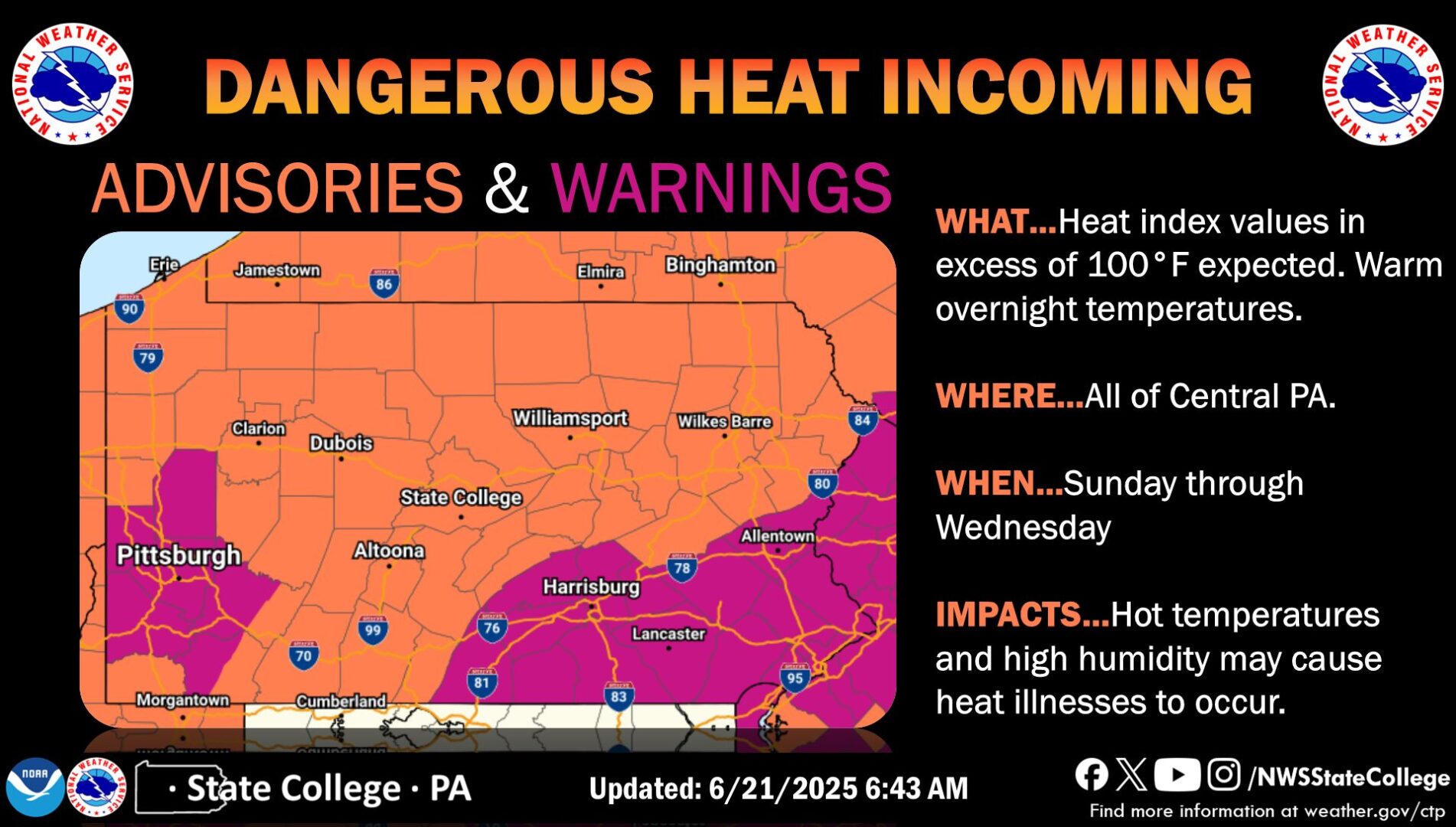Updated 1:12 p.m. Saturday, June 21.
Potentially record-breaking temperatures and high humidity are expected as the first heat wave of the summer bears down on Centre County.
The National Weather Service has upgraded an extreme heat watch to a heat advisory for central Pennsylvania from Sunday morning through Wednesday evening with highs in the 90s each day. “Heat index values over 100” are are expected throughout the region, according to the NWS.
“We just went through a miserable stretch of weather where it was cloudy for days and days and it rained and it was cool and people were asking ‘When’s summer going to get here?’ Well, summer’s coming with a vengeance,” AccuWeather senior meteorologist Tom Kines said.
While Friday — the summer solstice — was comfortable with highs in the 70s and low humidity, temperatures are expected to climb into the mid-to-upper 80s on Saturday as a mass of warm air moves east. Then it will get really hot.
“[The air mass] is probably going to come to a standstill at some point and probably take up residence in the eastern part of the country, at least for a few days,” Kines said. “So, it’s a warm air mass to begin with. It’ll probably get a little bit warmer than what it is right now just because it’s been sitting over land for several days and heat up.”
Sunday will kick off a stretch of four consecutive days with temperatures reaching the mid-90s accompanied by high humidity. AccuWeather forecasts a RealFeel —incorporating multiple factors to determine how the temperature feels to the human body —of up to 100 degrees each day.
AccuWeather’s forecasted high of 95 degrees on Sunday in State College would break the record of 93, and the 94 degrees predicted on Tuesday would tie the record.
It will also be the longest streak of consecutive 90+ degree days since July 18-24, 2011, Kines said.
“Four days in a row [of 90-degree temperatures] is pretty significant for this area,” he said. “That doesn’t happen too often.”
Overnight low temperatures will also be warm with persistent humidity, making for uncomfortable sleeping conditions for those without air conditioning.
Extreme heat and high humidity significantly increase the chance of heat-related illnesses, which can range in severity from cramps to life-threatening heat stroke. The NWS encourages people to check up on neighbors and relatives and provide pets with adequate water and shelter from the sun.
“Those that have to be outside that Sunday through Wednesday time frame, you’ve got to take it easy, stay hydrated and wear not only lightweight clothing, but light-colored clothing as well,” Kines said.
To avoid heat illness, drink more fluids than usual (water and sports drinks); limit outdoor activity; wear light-colored, lightweight, loose-fitting clothing; use sunscreen and other sun protection; and use air conditioning or go to an air-conditioned space.
“If you have access to an air conditioner, use it,” Kines said. “If your neighbor has a pool and you don’t, now’s the time to make sure that you’re on good terms with that neighbor.”
While temperatures will start to come down on Thursday, Kines expects it will remain warm and humid into next weekend.
“We’re not going to see days in the 60s where it breaks,” he said. “I think it could be a gradual switch. I don’t think the humidity is coming down very much.”
Energy Saving Tips
FirstEnergy offered several tips for controlling electricity costs while staying cool during a heat wave.
- Boost airflow with ceiling or box fans to reduce air conditioner use.
- Use window AC units only when rooms are occupied.
- Set thermostats as high as comfort allows.
- Block the sun by keeping blinds and curtains closed during daylight hours.
- Close vents and doors to rooms not being used.
- Delay chores like laundry, dishwashing and cooking until early morning or late evening.
- Grill outdoors instead of heating up your kitchen.
- Unplug electronics and chargers when not in use.
- Choose Energy Star appliances and HVAC systems when upgrading.
- Clean or replace HVAC filters regularly.



